Watch the Women in Preservation Symposium recordings online!

April 5-7, The National Society of The Colonial Dames of America and the Smithsonian Institution presented a three-day celebration of women and their pivotal role in American preservation.
Now you can revisit those dynamic discussions on the NSCDA YouTube channel. Click on the YouTube logo above to see the program, saved as the Women In Preservation Symposium Playlist, and select your first video to watch!
SYMPOSIUM SCHEDULE:
Day One, Monday, April 5
- 9:00 AM – 9:05 AM // WELCOME
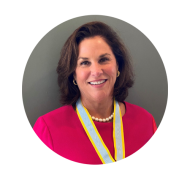
Ms. Katherine Cammack
NSCDA President
Katherine Taylor Cammack, a native of North Carolina and graduate of the University of North Carolina at Chapel Hill, is the current National President of The National Society of The Colonial Dames of America.
Her prolific involvement with the NSCDA spans her county committee (New Hanover County, NC), the NC Society, and the National Executive Committee where she served six years as National Assistant Treasurer, followed by four years as National Treasurer. During her time as National Treasurer, she also served on the Dumbarton House Board and the National Strategic Planning Committee and acted as Chairman of the Dumbarton House Fund for the Future, the Finance Committee, and the Audit Committee. In October 2018, Katherine became Chairman of the NSCDA’s National Museum Alliance Committee. During her tenure, she oversaw the launch of the Great American Treasures museum alliance initiative to the public.
Outside of the NSCDA, Katherine is a Senior Vice President with Arthur J. Gallagher & Co., Chairman of the Champion McDowell Davis Foundation, and Chairman of the Babies Hospital Foundation of Wilmington, NC.

Ms. Stephanie Stebich
Margaret and Terry Stent Director of the Smithsonian American Art Museum
Stephanie Stebich is the Margaret and Terry Stent Director of the Smithsonian American Art Museum, where she is responsible for the nation’s premier collection of American art and major exhibition, research, publication, education and digital-media programs at the museum and its Renwick Gallery. She also is a trustee of the American Alliance of Museums. Before coming to the Smithsonian Institution, Stebich had been the executive director of the Tacoma Art Museum in Washington from 2005-2017. Under her leadership, the museum underwent a major renovation that doubled its exhibition space; launched a capital campaign with a goal of $17 million and raised more than $37 million; and added endowed curator, educator and fellow positions. Prior to that Stebich was assistant director of the Minneapolis Institute of Arts from 2001 to 2004 and assistant director at the Cleveland Museum of Art from 1995 to 2001. She was previously a trustee of the Association of Art Museum Directors from 2010 to 2012, where she led and implemented its diversity initiative as chair of the membership committee. Stebich earned a bachelor’s degree in art history from Columbia University and a master’s degree with a concentration in modern art from the Institute of Fine Arts at New York University. She has a certificate in nonprofit management from Case Western Reserve University and is a graduate of the Getty Leadership Institute in Los Angeles. She was a fellow at the Guggenheim Museum and has studied at the University College London.
- 9:05 AM – 10:15 AM // HerStory in Preservation: Celebrating the women of the past and recognizing their contributions to the present

Dr. Michelle Anne Delaney
Assistant Director for History and Culture, Smithsonian National Museum of the American Indian
Dr. Michelle Anne Delaney is the Assistant Director for History and Culture at the Smithsonian National Museum of the American Indian, leading the museum scholarship division. Previously Delaney was Senior Program Officer and director of the Grand Challenges Consortium for Understanding the American Experience for the Smithsonian Under Secretary for History, Art, and Culture. She also served as the curator of photography in the Photographic History Collection, National Museum of American History. In 2019, Delaney chaired the editorial committee for the Smithsonian American Women book and published her dissertation, Art and Advertising in Buffalo Bill’s Wild West, with University of Oklahoma Press. An author and editor of several additional history of photography books, Delaney has also curated 25 Smithsonian photography exhibitions and related web projects. She is a current Advisory Board member for the Buffalo Bill Center of the West, and received her History PhD. from the University of Strathclyde, Glasgow, Scotland, in 2018.
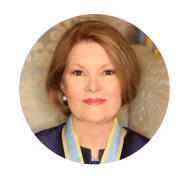
Ms. Anna Duff
Honorary President, NSCDA
A native of Thomasville, Georgia, Anna Duff attended schools in her hometown and is a graduate of the University of Georgia. Prior to her marriage, she lived in Savannah, Georgia, where she was Director of a maritime museum. She and her husband, Steven, met in Charlotte, North Carolina. The couple moved to New York City when they married and currently reside in Ponte Vedra Beach, Florida.
With a lifelong interest in historic preservation, Anna has been involved with various historic houses over the thirty-five years she has been a member of the NSCDA. In New York, she served as President of the New York Society and become involved in the Van Cortlandt House Museum, the first museum property adopted by one of the Corporate Societies of the NSCDA. The preservation of this house by the New York Dames placed the NSCDA in the vanguard of historic preservation in 1897. She has served as a Vice Chairman and Chairman of the NSCDA National Museum Properties Committee, as a Regent of George Mason’s Gunston Hall, as the NSCDA Vice President for National Headquarters Dumbarton House and Chair of the Dumbarton House Board, and NSCDA National President, retiring last fall. This past spring the NSCDA launched its latest initiative Great American Treasures Museum Alliance, a curated collection of over 60 museum sites around the country and including Sulgrave Manor in Great Britain. Currently, Anna serves on the National Headquarters Dumbarton House Board and is a trustee of the Friends of Sulgrave Manor.

Dr. Lydia Brandt
Associate Professor of Art History, School of Visual Art and Design, University of South Carolina
The University of Virginia Press published her first book, First in the Homes of His Countrymen: George Washington’s Mount Vernon in the American Imagination in 2016. It is the recipient of the Henry-Russell Hitchcock Award from the Victorian Society in America. She has published in a range of books and journals including Winterthur Portfolio, Antiques & Fine Art, and edited volumes by Carnegie Mellon University Press and UVA Press. Fellowships from the Fred W. Smith National Library for the Study of George Washington at Mount Vernon; the Andrew W. Mellon Foundation; the Crystal Bridges Museum of American Art; Winterthur Museum, Garden, and Library; and the Henry Luce Foundation have supported her research.
Dr. Brandt is also a dedicated advocate for local history and preservation. She has authored the National Register of Historic Places nominations in Virginia, South Carolina, and Illinois. She is one of three professors at the University of South Carolina who led the campaign for a monument to the university’s first African American professor, Richard T. Greener, erected in early 2018. Her guidebook of the South Carolina State House Grounds will be published by the University of South Carolina Press in early 2021.
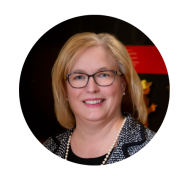
Ms. Amy Williams
Chief of Museum Operations, Andrew Jackson Foundation
Amy Williams joined the Andrew Jackson Foundation as its first Chief of Museum Operations in August, 2018. In this role, Williams oversees the day-to-day operation of Andrew Jackson’s Hermitage, the 1100+ acre home of the 7th President of the United States. Prior to joining the Foundation, Williams served as Deputy Director of the Harry S. Truman Presidential Library and Museum, one of 13 Presidential Libraries operated by the National Archives and Records Administration. Williams holds her B.A. from the College of William & Mary in Virginia and earned a M.A. in History and M.L.S. through the Dual Degree Program in Archival Management from Simmons College.
Williams is part of a long tradition of female leadership at the Andrew Jackson Foundation which was founded in 1889 as the Ladies Hermitage Association. An 1888 proposal in the Tennessee legislature to convert the Hermitage Mansion into a hospital for invalid Confederate soldiers outraged a group of Tennessee women. They created the Ladies Hermitage Association, based strongly on the newly formed Mount Vernon Ladies Association, to save The Hermitage and advocate for its preservation. From the first restoration project undertaken by these determined ladies to the use today of lidar technology to survey the land, the goal has remained the preservation of this extraordinary American landmark.
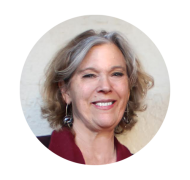
Ms. Elizabeth Kostelny
Chief Executive Officer, Preservation Virginia
Since 1990, Elizabeth S. Kostelny has been a member of Preservation Virginia’s staff, the nation’s first statewide nonprofit historic preservation organization. She began as its Curator of Collections, and since 2001, has served as the organization’s Chief Executive Officer.
Under Ms. Kostelny’s leadership, Preservation Virginia has expanded its programs and advocacy efforts to inspire and engage the public to foster, support, and sustain Virginia’s historic places. Through its six historic sites, the organization shares stories of our past to offer vital lessons to present and future generations about all facets of our complex history. Its statewide preservation initiatives offer resources to support individuals, groups, and localities interested in saving, preserving and revitalizing historic structures, cultural landscapes and old neighborhoods.
With the approach of 2007, Ms. Kostelny led the effort for the organization to plan new facilities at Historic Jamestowne. These new facilities interpret the recent archaeological discoveries that are providing new insights into the opening chapters of our nation’s history.
Prior to her tenure at Preservation Virginia, Ms. Kostelny worked at McKissick Museum, University of South Carolina. She graduated from the University of South Carolina with an M. A. in Art History. Her undergraduate degree is in Art Education from Longwood University.
She currently volunteers on the John Marshall Center for Constitutional History and Civics Board and the Chesapeake National Recreation Area Coalition. Previously, she offered her time to the National Trust’s Steering Committee for the Partners Network, and the Citizens Advisory Council on Furnishing and Interpreting the Executive Mansion.
- 10:15 AM – 10:30 PM // Flash Talk: Saving the American Flag with the Smithsonian’s Richard Kurin
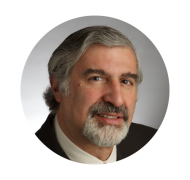
Dr. Richard Kurin
Dr. Richard Kurin, Distinguished Scholar and Ambassador-at-Large, Smithsonian Institution
Dr. Richard Kurin helps guide the world’s largest museum, research and educational organization. During his 45-year career Kurin has served as the Smithsonian’s Acting Provost, Under Secretary for Museums and Research, and Under Secretary for History, Art, and Culture, overseeing all of the Institution’s national museums, scientific research centers, and cultural programs. For two decades he served as Director of the Center for Folklife and Cultural Heritage, responsible for the annual Smithsonian Folklife Festival, Smithsonian Folkways Recordings, and a variety of cultural educational programs including major national celebration events on the National Mall of the United States. He also served as Director of Smithsonian National Programs, Acting Director of the Freer and Sackler Galleries of Asian Art, and of the Hirshhorn Museum and Sculpture Garden, and is in addition to his current role also serving as the Interim Director of the Center for Folklife and Cultural Heritage.
Kurin received his PhD in anthropology from the University of Chicago, aided by Fulbright and other fellowships. Kurin served on various UNESCO commissions and helped draft an international treaty to safeguard living cultural heritage now ratified by more than 170 nations. He has led efforts to save heritage around the world threatened by human conflict and natural disasters. He serves on the U.S. Department of State Cultural Heritage Coordinating Committee, is a founding board member of the International Alliance for the Protection of Heritage in Conflict Areas (ALIPH Foundation), and co-leads with FEMA the U.S. Heritage Emergency National Task Force. He has long served as Smithsonian liaison to the White House Historical Association and to the President’s Committee for the Arts and Humanities. Kurin taught at Johns Hopkins University School of Advanced International Studies and has authored six books among them Reflections of a Culture Broker: A View from the Smithsonian, Saving Haiti’s Heritage: Cultural Recovery after the Earthquake, The Smithsonian’s History of America 101 Objects¸ and Hope Diamond: The Legendary History of a Cursed Gem. He has been honored by Harvard University’s Peabody Museum, the International Council of Museums, the American Anthropological Association, the American Folklore Society, the Cosmos Club, and others, and is an elected fellow of the American Academy of the Arts and Sciences and senior fellow at the Atlantic Council.
- 10:30 AM – 11:30 AM // Collecting Women: Behind the scenes in the Smithsonian’s Political History Collection
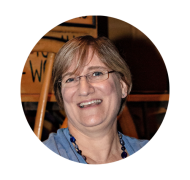
Dr. Lisa Kathleen Graddy
Curator, Division of Political and Military History, National Museum of American History
Lisa Kathleen Graddy has worked at the Smithsonian’s National Museum of American History since 1989 and serves in the museum’s Division of Political History as a curator of American political history, reform movements, and women’s political history which includes the Institution’s famous first ladies collection.
She is the curator of the museum’s popular ongoing exhibition, The First Ladies. Her recent work includes the museum’s new exhibition, Creating Icons: How We Remember Woman Suffrage the voting rights section, “A Vote, A Voice,” as a co-curator of the exhibition, American Democracy: A Great Leap of Faith and the companion book, American Democracy: A Great Leap of Faith (Smithsonian Books, 2017). Graddy was an author and member of the editorial committees for Smithsonian American Women Smithsonian Books, 2019).
Graddy’s work and research centers on the ways that Americans, particularly women, have found a public voice and wielded political power through organizing, participating in, and building institutions such as reform movements, voting rights movements, suffrage organizations, and political parties.
She is the curator of the museum’s popular ongoing exhibition, The First Ladies. Her past work includes the exhibitions The National Woman Suffrage Parade, 1913; The First Ladies; A First Lady’s Debut; The First Ladies at the Smithsonian; Exhibiting George Washington; and as co-curator, the traveling exhibition, First Ladies: Political Role and Public Image. She is co-author of two books on the Smithsonian’s first ladies collection, First Ladies: Political Role and Public Image (Scala Publishers, Ltd., 2004) and The Smithsonian First Ladies Collection (Smithsonian Books, 2014).
Lisa Kathleen is currently working on books and programs to mark the 100th anniversary of the Nineteenth Amendment and continuing to research and expand the collections documenting the women in American political life. Like Alice Paul she’s moving on to the ERA.
- 11:30 PM – 11:45 PM // Flash Talk: Honoring People at Historic Places with Dr. Rowena Dasch of the Neill-Cochran House Museum and Dr. Tara Dudley of The University of Texas at Austin

Dr. Rowena Dasch
Executive Director, Neill-Cochran House Museum
Rowena Houghton Dasch has led the Neill-Cochran House Museum as Executive Director since the end of 2013. She holds an MA and a Ph.D in American Art from the University of Texas at Austin and an AB in Art and Archaeology from Princeton University.
During her tenure at the NCHM, Rowena has focused on increasing the diversity of the displays, mounting a first-ever curated exhibition of paintings, installing a didactic display of silver-working methods, and overseeing annual exhibits in the museum’s upstairs gallery. Her day-to-day work covers all facets of the museum’s operations and the historic property’s preservation, including planning and implementation of a major structural restoration project, annual fundraising, educational programming for adults and families, and collections management.

Dr. Tara Dudley
Lecturer, School of Architecture, The University of Texas at Austin
Tara Dudley is a Lecturer in The University of Texas at Austin School of Architecture where she teaches Interior Design History, American Architecture, and African American Experiences in Architecture. Her work explores preservation issues on local, regional, and national levels. She has been involved in various aspects of historic preservation, historical research, and writing and consults on projects across the nation. Her research focuses on nineteenth-and early-twentieth-century American architecture and design, specifically the under-told and untold contributions of African Americans. Her research methodology includes creative utilization of archival resources and conducting oral histories. Notably, she has applied this approach to her study of the architectural activities of New Orleans’ gens de couleur libres (free people of color); Dr. Dudley’s first book publication, Building Antebellum New Orleans: Free People of Color and their Influence, will be released by UT Press in August 2021. Her work on the free people of color has won several awards, including the Carter Manny Fellowship from the Graham Foundation and a special award from the Global Architectural History Teaching Collaborative. Dr. Dudley is also under contract to write a biography on African American architect John Saunders Chase.
- 11:45 PM – 1:00 PM // LUNCH
- 1:00 PM – 2:30 PM // Preservation by All, for All: Uncovering stories, updating narratives, and removing barriers so that everyone has a seat at the preservation table

Dr. Michelle Magalong
Fellow at the School of Architecture, Planning & Preservation, University of Maryland
Michelle G. Magalong is a Presidential Postdoctoral Fellow at the School of Architecture, Planning and Preservation at University of Maryland. She brings to this role her extensive professional and research experience in community development, historic preservation and public health in underserved communities. She received her BA in Ethnic Studies and Urban Studies and Planning at University of California, San Diego (UCSD), and MA in Urban Planning at University of California, Los Angeles (UCLA). Dr. Magalong serves as President of Asian and Pacific Islander Americans in Historic Preservation (APIAHiP), a national volunteer-run, nonprofit organization. Her research and professional experience focus on community engagement, historic preservation, and social justice. She has served in advisory roles in historic preservation and community development, notably for the National Park Service, California State Office of Historic Preservation, and City of Los Angeles Office of Historic Resources. She was also recognized in 2018 as one of the “40 Under 40: People Saving Places” by National Trust for Historic Preservation.

Mx. Ty Ginter
Co-founder, CD Dykaries
Ty Ginter (they/them) is a Queer hxstorian and historic preservationist who specializes in intangible heritage and the built environment. They are the co-founder of D.C. Dykaries, an oral history and documentation project that focuses on documenting and preserving Washington, D.C.’s lost lesbian, Sapphic and womxn’s heritage. They are the author of the chapter “Tradition, Community, and Grungy Secret-ness: What Preservationists Can Learn from the Story of Phase One” in Preservation and Place: Historic Preservation by and of LGBTQ Communities in the United States. Their thesis, “D.C.’s Dykaries: Phase One – D.C.’s Last Dyke Bar (1971-2016)” is available for free on the Digital Repository of the University of Maryland (DRUM). Ty and Dykaries can be followed @dykaries on Facebook and on Twitter or Instagram @presbutch.

Dr. Sarah Zenaida Gould
Director, Museo del Westside
Sarah Zenaida Gould, Ph.D. is Interim Executive Director of the Mexican American Civil Rights Institute, a national project to collect and disseminate Mexican American civil rights history. A longtime public historian, she has curated over a dozen exhibits on history, art, and culture, and was formerly founding director of the Museo del Westside and lead curatorial researcher at the Institute of Texan Cultures. Gould is co-founder and co-chair of Latinos in Heritage Conservation, a national organization that promotes historic preservation within American Latino communities and advocates for the protection of Latino tangible and intangible heritage. Additionally, she serves on the board of the Friends of the Texas Historical Commission, on the council of the American Association of State and Local History, and is an active member of the Westside Preservation Alliance, a coalition dedicated to promoting and preserving the working-class architecture of San Antonio’s Westside. She received a BA in American Studies from Smith College and an MA and PhD in American Culture from the University of Michigan. She is a former fellow at the National Museum of American History, the Winterthur Museum, and the American Antiquarian Society, and is an alumna of the National Association of Latino Arts and Culture Leadership Institute.

Ms. Monica Montgomery
Curator of Social Justice, Programs & Special Projects, Arts and Industries Building, Smithsonian Institution
Monica O. Montgomery MA, is the newly minted Curator of Special Projects + Programming + Social Justice with Smithsonian Institution Arts + Industries Building. As an arts administrator and independent curator she uses her platforms to be in service to society, working at the intersection of equity, community and diversity in museums. She has curated dozens of social justice themed exhibits, experiences and festivals with renowned organizations like the South African Embassy, SXSW Edu, Brooklyn Museum, Portland Art Museum, National Trust for Historic Preservation, Historic House Trust of NY, Weeksville Heritage Center, Teachers College, The New School, The Highline, T Thomas Fortune Cultural Center and more.
Monica is a seasoned public speaker who has delivered a TedX talk entitled ‘How To Be an Upstander’, challenging everyone to stand up, speak up and act up for social good. She has honed her talents over two decades in culture, nonprofits and universities as: graduate professor, executive director, diversity trainer, festival planner, program manager, marketer, fundraiser, event producer and museum educator. Monica teaches graduate courses around Museums and Social Change at: American University, Johns Hopkins University, Harvard University, American University, Pratt Institute and NYU. She was a visiting scholar at Mississippi State University in Starkville, MS and the University of Minnesota in Minneapolis, MN, She frequently guest lectures at Princeton University, Georgetown University, Columbia University, University of the Arts, and University of Maryland and Howard University’s James A. Porter Colloquium.
She is the CoFounder and strategic director of Museum Hue, leading the premiere multicultural group, in advancing the visibility and viability of BIPOC in museums, building diverse representation and equity through advocacy with members throughout Europe and North America.
She recently completed a fellowship with Oxford Cultural Leaders at Oxford University UK and she holds a Bachelors of Arts in Broadcast Communication from Temple University and Masters of Arts in Corporate Communication from LaSalle University. She is an arts and culture innovator, who has been featured in the media on Humans of New York, C-Span, Hyperallergic, Radio One, Black Art in America, and The Museum Life podcast.
- 2:30 PM – 2:45 PM // Flash Talk: Living Memory with Stenton’s Laura Keim and Cheyney McKnight, Founder and Owner, Not Your Momma’s History

Ms. Laura Keim
Curator, Stenton
Laura Keim curates historical objects, collections, and places, seeking to understand them and share their evolving contexts and meanings over time and today. She studies architecture, decorative arts, and material culture of the British and North American Atlantic world in the 18th and early 19th centuries, as well as the history of collecting and reinvention of the past in England and America in the 20th century.
Laura is Curator of Stenton, the c.1730 seat of the Logan family near Germantown and is a Lecturer in the Graduate Program in Historic Preservation at the University of Pennsylvania. She holds an M.S. from the Penn Preservation Program, an M.A. in Early American Culture from The University of Delaware’s Winterthur Program, and an A.B. in Art History from Smith College.
Her publications include a Stenton Guidebook, an exhibition catalog, LOGANIA: Stenton Collections Reassembled, articles in The Magazine ANTIQUES, Antiques and Fine Art, and Ceramics in America, and recently, “Why Do Furnishings Matter?: The Power of Furnishings in Historic House Museums,” a chapter in Reimagining Historic House Museums: New Approaches and Proven Solutions, and “Remembering the ‘Olden Time’: John Fanning Watson’s Cultivation of Memory and Relics in Early National Philadelphia,” in A Material World: Culture, Society, and the Life of Things in Early Anglo-America.

Ms. Cheyney McKnight
Founder and Owner, Not Your Momma’s History
Not Your Momma’s History consults with and aids museums, historical sites, historical societies, private businesses, etc. in developing specialized programming about slavery and the African experience within 18th and 19th century America. NYMH also trains staff from all backgrounds on how to talk about slavery with diverse audiences.
Cheyney McKnight is the founder and owner of Not Your Momma’s History. She acts as an interpreter advocate for interpreters of color at historical sites up and down the east Coast, providing them with much needed on-call support.
Cheyney has interpreted 18th, early 19th, and mid-19th-century slavery as a Living Historian in 26 states, and has worked with over 45 historic sites. She is an experienced historical interpreter with over 3000 hours of interpretive experience. Cheyney has also crafted and written over 18 tours for sites in Virginia and has written 13 specialized museum programs throughout the East Coast. She is also an experienced hearth cook and public speaker.
- 2:45 PM – 4:00 PM // The Power of Passion: Inspiring an appreciation for preservation in others

Ms. Katrina Lashley
Program Coordinator, Smithsonian’s Anacostia Community Museum
Katrina D. Lashley is a Program Coordinator at Smithsonian’s Anacostia Community Museum where she leads the Urban Waterways Project, a long-term research and educational initiative which documents the relationship between urban communities and their watersheds through the lenses of civic oversight, community engagement, and environmental advocacy. Lashley also leads the Women’s Environmental Leadership Initiative (WEL) which builds capacity for future environmental leadership by convening a national and international network of established women environmental leaders with emerging and aspiring leaders for in-person discussions focused on the exchange of best practices, wisdom, and experience
Lashley received her BA in English Literature and Italian at Rutgers University and earned an MA in History (Public History track) at American University, with a focus on the British Caribbean. She has worked on projects for the National Museum of American History and Arlington House. In addition to her Public History work, Lashley taught English Literature and English Language for 12 years.

Ms. Katherine Malone-France
Chief Preservation Officer, National Trust for Historic Preservation
Since 2019, Katherine Malone-France has served as the Chief Preservation Officer of the National Trust for Historic Preservation. In this capacity, she leads the organization’s programmatic work in field services, government relations, state and local policy, research, trainings, grantmaking, and the stewardship and interpretation of the National Trust’s portfolio of 28 historic sites.
Throughout her almost 20 years in the for-profit and non-profit sectors of historic preservation, Katherine has made a concerted effort to work across the field—serving as the executive director of the Historic Hillsborough Commission in North Carolina, as the curator and deputy director at Decatur House, a National Trust Historic Site, and as the Senior Project Manager at a highly-respected preservation contracting firm in the mid-Atlantic. From these experiences, Katherine brings the ability to understand preservation issues from a variety of perspectives and to move initiatives forward in ways that are both creative and strategic.
After returning to the National Trust in 2011 to serve as the Director of Outreach, Education, and Support, Katherine became the Senior Vice President for Historic Sites in 2014, notably as the first woman in the history of the National Trust to lead the Historic Sites Department. In this capacity, she collaborated with a variety of staff and stakeholders to make National Trust Historic Sites more culturally and financially sustainable. This work has ranged from telling the full histories of these properties through creative and inclusive programming to implementing a new “shared use” operating model that combines commerce and interpretation to activate historic sites in new ways and attract broad audiences to them. Katherine leadership has also resulted in a diverse range of collaborations with contemporary artists creating new works inspired by National Trust sites and a revision of the National Trust’s collections management policy that has been hailed as a national model for its inclusion of historic structures and landscapes in addition to objects.
Katherine has increased the support for National Trust Historic Sites from government and foundation funders and she secured dedicated endowments for the stewardship and interpretation of both historic landscapes and collections at National Trust Historic Sites. Working with the talented staff and dedicated stakeholders across National Trust, Katherine’s leadership has also supported increases in visitation and earned revenue across the portfolio of sites, while completing a $21 million initiative to address deferred maintenance at these properties. Additionally, Katherine has lectured and presented extensively around on the country and internationally on re-imaging historic sites and the intersection between historic preservation and the arts.
Katherine is a graduate of Wofford College with a B.A. degree in History and has a Masters in Historic Preservation from the College of Environment & Design at the University of Georgia.

Ms. Ember Farber
Advocacy Director, American Alliance of Museums
As the Alliance’s Director, Advocacy, Ember communicates with AAM’s advocate network and the field about federal policy issues and advocacy opportunities through legislative and advocacy updates, calls-to-action, social media, AAM’s multiple print and digital platforms and live and on-line programs and presentations. Ember also maintains AAM’s public advocacy materials at www.aam-us.org/advocacy, designed to mobilize and engage advocates at all experience levels. Ember works directly with museum advocates nationwide, AAM’s Affiliate, regional and state museum association partners, and promotes AAM’s legislative agenda with members of Congress and their staff and in speaking engagements around the country. Ember also plays a critical role in Museums Advocacy Day and executes AAM’s annual August #InviteCongress to Visit Your Museum initiative. Her experience spans private and nonprofit sectors, having worked with Fortune 10 clients as a grassroots and public affairs consultant, the National Grocers Association and several other nonprofits prior to joining AAM in November 2003. Advocacy is a personal and professional passion for Ember who holds a Master’s degree in Political Management from the George Washington University and Bachelor’s degrees in American Government and English Literature and Composition from the University of Virginia.
- 4:15 PM – 5:00 PM // Keynote Interview: Lonnie G. Bunch III
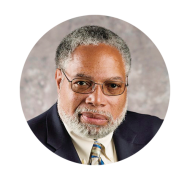
Lonnie G. Bunch III, Secretary of the Smithsonian Institution
Lonnie G. Bunch III is the 14th Secretary of the Smithsonian Institution. He assumed his position June 16, 2019. As Secretary, he oversees 19 (soon to be 21) museums, 21 libraries, the National Zoo, numerous research centers, and several education units and centers.
Previously, Bunch was the director of the Smithsonian’s National Museum of African American History and Culture. When he started as director in July 2005, he had one staff member, no collections, no funding and no site for a museum. Driven by optimism, determination and a commitment to build “a place that would make America better,” Bunch transformed a vision into a bold reality. The museum has welcomed more than 6 million visitors since it opened in September 2016 and compiled a collection of 40,000 objects that are housed in the first “green building” on the National Mall.
Occupying a prominent location next to the Washington Monument, the nearly 400,000-square-foot National Museum of African American History and Culture is the nation’s largest and most comprehensive cultural destination devoted exclusively to exploring, documenting and showcasing the African American story and its impact on American and world history.
Before his appointment as director of the museum, Bunch served as the president of the Chicago Historical Society (2001–2005). There, he led a successful capital campaign to transform the Historical Society in celebration of its 150th anniversary, managed an institutional reorganization, initiated an unprecedented outreach initiative to diverse communities and launched a much-lauded exhibition and program on teenage life titled “Teen Chicago.”
A widely published author, Bunch has written on topics ranging from the black military experience, the American presidency and all-black towns in the American West to diversity in museum management and the impact of funding and politics on American museums. His most recent book, A Fool’s Errand: Creating the National Museum of African American History and Culture in the Age of Bush, Obama, and Trump, which chronicles the making of the museum that would become one of the most popular destinations in Washington.
Bunch has worked at the Smithsonian in the past, holding several positions at its National Museum of American History from 1989 through 2000. As the museum’s associate director for curatorial affairs for six years (1994–2000), he oversaw the curatorial and collections management staff and led the team that developed a major permanent exhibition on the American presidency. He also developed “Smithsonian’s America” for the American Festival Japan 1994; this exhibition, which was presented in Japan, explored the history, culture and diversity of the United States.
Bunch served as the curator of history and program manager for the California African American Museum in Los Angeles from 1983 to 1989. While there, he organized several award-winning exhibitions, including “The Black Olympians, 1904–1950” and “Black Angelenos: The Afro-American in Los Angeles, 1850–1950.” He also produced several historical documentaries for public television.
Born in Belleville, New Jersey, Bunch has held numerous teaching positions at universities across the country, including American University in Washington, D.C., the University of Massachusetts in Dartmouth and George Washington University in Washington, D.C.
In service to the historical and cultural community, Bunch has served on the advisory boards of the American Association of Museums and the American Association for State and Local History. In 2005, Bunch was named one of the 100 most influential museum professionals of the 20th century by the American Association of Museums.
Among his many awards, he was appointed by President George W. Bush to the Committee for the Preservation of the White House in 2002 and reappointed by President Barack Obama in 2010. In 2019, he was awarded the Freedom Medal, one of the Four Freedom Awards from the Roosevelt Institute, for his contribution to American culture as a historian and storyteller; the W.E.B. Du Bois Medal from the Hutchins Center at Harvard University; and the National Equal Justice Award from the NAACP’s Legal Defense Fund.
Bunch received his undergraduate and graduate degrees from the American University in Washington, D.C.

Day Two, Tuesday, April 6
- 9:00 AM – 10:15 AM // Advocacy Is Action

Corine Wegener
Director, Smithsonian Cultural Rescue Initiative
Corine Wegener is director of the Smithsonian Cultural Rescue Initiative (SCRI), an outreach program dedicated to the preservation of cultural heritage in crisis situations in the U.S. and abroad. SCRI’s work has included projects in Syria, Iraq, Haiti, Nepal, and around the world. SCRI also co-chairs, with FEMA’s Office of Environmental and Historic Preservation, the Heritage Emergency National Task Force, part of the U.S. National Disaster Recovery Framework. Before coming to the Smithsonian in 2012, Wegener was an associate curator in the department of Decorative Arts, Textiles, and Sculpture at the Minneapolis Institute of Art. During a concurrent career as a U.S. Army Reserve officer, she served on several military deployments, including as an Arts, Monuments, and Archives Officer assigned to assist after the 2003 looting of the Iraq National Museum. Wegener has a bachelor’s degree in Political Science from the University of Nebraska Omaha and MA degrees in Political Science and Art History from the University of Kansas.

Lori Foley
Coordinator, Heritage Emergency National Task Force, Federal Emergency Management Agency, Department of Homeland Security
Lori Foley is the Coordinator of the Heritage Emergency National Task Force (HENTF), a public-private partnership between FEMA’s Office of Environmental Planning & Historic Preservation and the Smithsonian Cultural Rescue Initiative. At FEMA, Lori promotes collaboration and information sharing between the cultural heritage and emergency management communities to protect the nation’s cultural heritage. When disaster strikes, she coordinates technical assistance offered by HENTF’s 60 federal agency and national service organization members to help the cultural heritage community respond and recover. Lori is a National Heritage Responder of the Foundation for Advancement in Conservation, a member of the International Association of Emergency Managers, a member of the US Committee of the Blue Shield, and an advisor to numerous statewide cultural heritage emergency networks.

Ms. Mary Ruffin Hanbury
President, Hanbury Preservation
A native of Portsmouth, Virginia, Mary Ruffin Hanbury has worked in the historic preservation field for over twenty-five years. She received an undergraduate degree in art history from Yale University and a master’s degree in urban and environmental planning from the School of Architecture at the University of Virginia.
Prior to establishing her own consulting firm, she was the architectural historian for the eastern region of Virginia at the Virginia Department of Historic Resources. She then moved to Charleston, South Carolina where she worked for the Southern Office of the National Trust for Historic Preservation providing advisory and field services, developing and implementing strategies for key intervention and advocacy issues throughout the region, but primarily in Louisiana, Florida, Kentucky, Puerto Rico, and the U.S. Virgin Islands. After leaving the Trust, she worked at the North Carolina State Historic Preservation Office as the liaison to local governments, reviewing all local designation reports, preservation plans, guidelines, and ordinances and managing the federal Certified Local Government program for the State of North Carolina.
In 2008 she left state government to establish Hanbury Preservation Consulting. The firm provides a full spectrum of preservation-related planning services to organizations, governments, individuals and corporate clients. The firm has completed projects in thirteen states from New Jersey to Montana ranging from tax credit, compliance, and survey projects, to preservation plans and feasibility studies for nonprofits, municipalities, and heritage areas.
Ms. Hanbury lives in Raleigh, North Carolina with her husband and son.

Sharon Park
Associate Director, Architectural History and Historic Preservation Division, Smithsonian Institution
Sharon C. Park, FAIA, is the Associate Director, Architectural History and Historic Preservation, Smithsonian Institution, Washington, DC. She is in the Office of Planning Design and Construction and serves as the Smithsonian’s Historic Preservation Officer. She directs the historic preservation approaches to the over 40 historic properties owned or managed by the Smithsonian. Five buildings are National Historic Landmarks and most of the historic properties are located within National Register of Historic Places Historic Districts. She is responsible for implementing the Smithsonian’s Preservation Policy and ensuring that the care of these significant resources meets high standards of preservation. She is an architect and serves on many blue ribbon panels and preservation committees and from 2009-2017 was the American representative to the International Centre for the Study of the Preservation and Restoration of Cultural Property (ICCROM) in Rome, Italy. She has been with the Smithsonian for 14 years and was with the National Park Service managing the Historic Tax Credit Program prior to coming to the Smithsonian.
- 10:15 AM – 10:30 PM // Flash Talk: Rescuing History from War and Nature with the Smithsonian’s Richard Kurin

Dr. Richard Kurin
Dr. Richard Kurin, Distinguished Scholar and Ambassador-at-Large, Smithsonian Institution
Dr. Richard Kurin helps guide the world’s largest museum, research and educational organization. During his 45-year career Kurin has served as the Smithsonian’s Acting Provost, Under Secretary for Museums and Research, and Under Secretary for History, Art, and Culture, overseeing all of the Institution’s national museums, scientific research centers, and cultural programs. For two decades he served as Director of the Center for Folklife and Cultural Heritage, responsible for the annual Smithsonian Folklife Festival, Smithsonian Folkways Recordings, and a variety of cultural educational programs including major national celebration events on the National Mall of the United States. He also served as Director of Smithsonian National Programs, Acting Director of the Freer and Sackler Galleries of Asian Art, and of the Hirshhorn Museum and Sculpture Garden, and is in addition to his current role also serving as the Interim Director of the Center for Folklife and Cultural Heritage.
Kurin received his PhD in anthropology from the University of Chicago, aided by Fulbright and other fellowships. Kurin served on various UNESCO commissions and helped draft an international treaty to safeguard living cultural heritage now ratified by more than 170 nations. He has led efforts to save heritage around the world threatened by human conflict and natural disasters. He serves on the U.S. Department of State Cultural Heritage Coordinating Committee, is a founding board member of the International Alliance for the Protection of Heritage in Conflict Areas (ALIPH Foundation), and co-leads with FEMA the U.S. Heritage Emergency National Task Force. He has long served as Smithsonian liaison to the White House Historical Association and to the President’s Committee for the Arts and Humanities. Kurin taught at Johns Hopkins University School of Advanced International Studies and has authored six books among them Reflections of a Culture Broker: A View from the Smithsonian, Saving Haiti’s Heritage: Cultural Recovery after the Earthquake, The Smithsonian’s History of America 101 Objects¸ and Hope Diamond: The Legendary History of a Cursed Gem. He has been honored by Harvard University’s Peabody Museum, the International Council of Museums, the American Anthropological Association, the American Folklore Society, the Cosmos Club, and others, and is an elected fellow of the American Academy of the Arts and Sciences and senior fellow at the Atlantic Council.
- 10:30 AM – 12:00 PM // The Next Generation: Empowering and promoting the voices of tomorrow

Eileen Graham
Partnerships Manager, Office of Fellowships and Interns, Smithsonian Institution
Eileen Graham’s work focuses on the expansion of academic appointment opportunities across the Smithsonian with the goal of increasing applicant diversity. She works with universities, federal agencies and other organizations to develop new programs bringing more students and researchers into contact with our experts, collections, and facilities. Prior to joining OFI, Eileen was the Program Manager for Scientific Collections International, a consortium of organizations dedicated to the promotion and use of scientific collections. In that role she focused on creating a unified voice for collections by forging relationships across disciplinary and international lines. Trained as a marine biologist, Eileen spent her time prior to the Smithsonian studying coastal and oceanic ecosystem. Most notably, she managed the collection and analysis of thousands of samples related to the biological impact of the Deepwater Horizon Oil Spill in the Gulf of Mexico.

Dr. Christine Henry
Assistant Professor of Historic Preservation, University of Mary Washington
Christine teaches classes in building investigation, architectural history, and oral history. Recently she has had an article titled “Getting to the Bottom of Ohio’s Mysterious Blue Hole” published in the Journal of the Society of Commercial Archaeology and co-authored a chapter in the edited volume “Contested Pasts: Urban Heritage in Divided Cities.” Before joining the faculty in Fredericksburg in the Fall of 2015 she spent close to 25 years living in Washington, DC where she restored an 1888 row house, worked for the Institute of Museum and Library Services, and investigated historic sites whenever possible. Her favorite place to learn about the city is from her own front porch.

Ms. Sarah Marsom
Heritage Resource Consultant
Sarah Marsom’s work as a heritage resource consultant is rooted in empowering the next generation of community advocates and increasing representation of lesser-known histories. With 10+ years of experience working in the cultural resources field, Sarah specializes in education and outreach strategies in addition to strategic planning. In 2018, Sarah was recognized by the National Trust for Historic Preservation as the recipient of the American Express Aspire Award during the 2018 National Preservation Awards and as an honoree of the inaugural 40 Under 40: People Saving Place’s list.
Sarah has been published as a contributor in Historic Preservation: An Introduction to Its History, Principles, and Practice (3rd ed.), Belt Publishing’s Columbus Anthology, and numerous zines. Her work has been featured in Curbed, Traditional Building Magazine, and the National Parks Service’s LGBTQ America Theme Study, amongst other publications and podcasts.

Ms. Zumilena Then
Founder, Preserving East New York
Zulmilena Then is a native Brooklynite who grew up in East New York. She received her Bachelor of Architecture from Pratt Institute and joined Weeksville Heritage Center in 2020 as the Preservation Manager of the Historic Hunterfly Road Houses. Before Weeksville, while being involved in the renovation of historic buildings throughout Brooklyn with the architectural firm Michael Ivanhoe McCaw Architect, P.C., she realized the power historic buildings have in anchoring our communities.
In 2015, her love for historic buildings and community inspired her to form, Preserving East New York (PENY), an organization focused on celebrating and elevating the voices of people of color to make a real social and political change to protect their communities through preservation. Her goal is to demonstrate the potential of preservation as a tool that can benefit neighborhoods of color socially, economically and culturally. Through PENY’s educational programming and outreach, she aims to help the community get interested and involved in the process of preserving their neighborhood’s historic resources. In 2017, she was honored to celebrate with her East New York community its fourth landmark after the last designation that took place 36 years prior.

Ms. Milan Jordan
Director, HOPE Crew, The National Trust for Historic Preservation
With a background in architecture and a passion for nonprofit management, Milan’s career is the intersection of mission-driven work for built and cultural environments. Milan is currently the Director of the HOPE Crew at the National Trust for Historic Preservation. HOPE Crew is bringing Hands-On Preservation Experience to the next wave of preservation tradespeople.
Prior to joining the National Trust, Milan was Director of Workforce and Emerging Professionals at the American Institute of Architects where she developed programming and resources for early-career professionals as well as women architects. Milan holds a Masters of Architecture from Georgia Institute of Technology and a Bachelors of Arts in American Studies from University of Maryland, College Park. She is a native Marylander and a voracious plant-lover.
- 12:00 PM – 12:15 PM // Flash Talk: Preserving Julia Child’s Kitchen with the Smithsonian’s Richard Kurin

Dr. Richard Kurin
Distinguished Scholar and Ambassador-at-Large, Smithsonian Institution
Dr. Richard Kurin helps guide the world’s largest museum, research and educational organization. During his 45-year career Kurin has served as the Smithsonian’s Acting Provost, Under Secretary for Museums and Research, and Under Secretary for History, Art, and Culture, overseeing all of the Institution’s national museums, scientific research centers, and cultural programs. For two decades he served as Director of the Center for Folklife and Cultural Heritage, responsible for the annual Smithsonian Folklife Festival, Smithsonian Folkways Recordings, and a variety of cultural educational programs including major national celebration events on the National Mall of the United States. He also served as Director of Smithsonian National Programs, Acting Director of the Freer and Sackler Galleries of Asian Art, and of the Hirshhorn Museum and Sculpture Garden, and is in addition to his current role also serving as the Interim Director of the Center for Folklife and Cultural Heritage.
Kurin received his PhD in anthropology from the University of Chicago, aided by Fulbright and other fellowships. Kurin served on various UNESCO commissions and helped draft an international treaty to safeguard living cultural heritage now ratified by more than 170 nations. He has led efforts to save heritage around the world threatened by human conflict and natural disasters. He serves on the U.S. Department of State Cultural Heritage Coordinating Committee, is a founding board member of the International Alliance for the Protection of Heritage in Conflict Areas (ALIPH Foundation), and co-leads with FEMA the U.S. Heritage Emergency National Task Force. He has long served as Smithsonian liaison to the White House Historical Association and to the President’s Committee for the Arts and Humanities. Kurin taught at Johns Hopkins University School of Advanced International Studies and has authored six books among them Reflections of a Culture Broker: A View from the Smithsonian, Saving Haiti’s Heritage: Cultural Recovery after the Earthquake, The Smithsonian’s History of America 101 Objects¸ and Hope Diamond: The Legendary History of a Cursed Gem. He has been honored by Harvard University’s Peabody Museum, the International Council of Museums, the American Anthropological Association, the American Folklore Society, the Cosmos Club, and others, and is a elected fellow of the American Academy of the Arts and Sciences and senior fellow at the Atlantic Council.
- 12:15 PM – 1:00 PM // LUNCH
- 1:00 PM – 2:30 PM // Law and Preservation: Exploring preservation through a legal and ethical lens

Farleigh Earhart
Associate General Counsel, Smithsonian Institution
Farleigh Earhart advises Smithsonian museums, the National Zoo, and administrative offices on a variety of matters, including personnel, regulatory compliance, scientific collaborations, gifts, and loans. Prior to joining the Smithsonian in 1999, Farleigh was an associate at Morgan, Lewis, and Bockius, LLP, in the firm’s environmental practice, and served as a trial attorney in the Environmental Crimes Section of the U.S. Department of Justice.
Farleigh received her undergraduate and law degrees with honors from the University of North Carolina at Chapel Hill. She clerked for the Honorable John M. Duhé Jr. on the U.S. Court of Appeals for the Fifth Circuit. She has served on the boards of several Washington, DC, non-profits including the Smithsonian Early Enrichment Center, the Association for the Preservation of Historic Congressional Cemetery, and the D.C. Preservation League. Farleigh currently serves on the board of her neighborhood’s historical society. Farleigh lives in Washington, DC, with her husband and daughter.

Ms. Marion F. Werkheiser
Founding Partner, Cultural Heritage Partners
Marion Werkheiser is an award-winning lawyer and chief executive at the law and policy firm Cultural Heritage Partners. Her well-established practice is firmly rooted at the intersection of development and preservation, and she advocates for responsible preservation policy at the federal level. She negotiates in Section 106 consultations on behalf of tribes, project proponents, local governments, and other consulting parties to achieve creative, win-win outcomes that appropriately balance preservation values and development needs. Marion also works with investors, financial institutions, and companies to conduct due diligence, assess project risk, and improve internal governance to reduce the impact of infrastructure and other projects on indigenous peoples and cultural heritage worldwide. She advises tribes on developing their own consultation and engagement protocols to promote free, prior, and informed consideration of project impacts.
Marion earned her J.D. from Harvard Law School and is licensed to practice law in California, Virginia, and the District of Columbia.

Dr. Patty Gerstenblith
Distinguished Research Professor of Law and Director of its Center for Art, Museum & Cultural Heritage Law, DePaul University
Gerstenblith has been a member of the Board of Directors of the U.S. Committee of the Blue Shield since its founding in 2006 and currently serves as the Board Secretary. In 2011, President Obama appointed her to serve as Chair of the President’s Cultural Property Advisory Committee in the Department of State on which she had previously served as a Public Representative in the Clinton administration. She was an Expert for the Fulbright Specialist Project at the Department of Antiquities of Jordan in 2019 and is a Research Associate at the University of Pennsylvania Museum of Anthropology and Archaeology and a member of the editorial board of the journal Art, Antiquity and Law.
She lectures widely in the United States and abroad on the protection of cultural heritage during armed conflict and international trade in art and antiquities. The fourth edition of her casebook, Art, Cultural Heritage and the Law, was published in 2019. Gerstenblith received her AB from Bryn Mawr College, PhD in art history and anthropology from Harvard University, JD from Northwestern University and an honorary Doctorate of Humane Letters from Hebrew Union College-Jewish Institute of Religion. Before joining the DePaul law faculty, Gerstenblith clerked for the Honorable Richard D. Cudahy of the U.S. Court of Appeals for the Seventh Circuit.

Ms. Emily Hotaling Eig
President, EHT Traceries Historic Preservation
Emily Eig is the founder and president of EHT Traceries, a women-owned company incorporated in Maryland and headquartered in Washington, D.C. As the head of EHT Traceries, she combines management of a fifteen-person firm with her work as an architectural historian and preservation consultant. Her technical knowledge is focused on late 19th-and 20th-century buildings and the integration of new buildings into historic settings, including historic sites, campuses, and districts. She has a thorough understanding of current historic preservation issues, including the interpretation of regulations related to the National Historic Preservation Act, as well as state and local laws. Through her role as the head of EHT Traceries since 1989, she has participated in numerous exceptional preservation-related projects around the country. She is a considered an expert in architectural history, resource evaluation, preservation planning, federal and state Historic Preservation Certification processes, Section 106 mitigation, the Secretary of Interior’s Standards for the Treatment of Historic Properties, and regularly advised on local and federal preservation reviews including Determination of Eligibility and Section 106 Memorandum of /Programmatic Agreements. Ms. Eig meets professional qualifications prescribed by the Secretary of the Interior (36 CFR 61 – Appendix A). She regularly testifies before the D.C. Historic Preservation Review Board; the Montgomery County (MD) Historic Preservation Commission; the Prince George’s County (MD) Historic Preservation Commission; the Old Georgetown (DC) Board; the Coral Gables (FL) Historic Preservation Commission; the DC Mayor’s Agent for Historic Preservation; the DC Zoning Commission; the DC Board of Zoning Adjustment; Superior Court of the District of Columbia; the National Capital Planning Commission; the Maryland-National Capital Park and Planning Commission; and the U.S. Commission of Fine Arts.
- 2:30 PM – 2:45 PM // Flash Talk: Keeping the Sounds of African and Native American History with the Smithsonian’s Richard Kurin

Dr. Richard Kurin
Distinguished Scholar and Ambassador-at-Large, Smithsonian Institution
Dr. Richard Kurin helps guide the world’s largest museum, research and educational organization. During his 45-year career Kurin has served as the Smithsonian’s Acting Provost, Under Secretary for Museums and Research, and Under Secretary for History, Art, and Culture, overseeing all of the Institution’s national museums, scientific research centers, and cultural programs. For two decades he served as Director of the Center for Folklife and Cultural Heritage, responsible for the annual Smithsonian Folklife Festival, Smithsonian Folkways Recordings, and a variety of cultural educational programs including major national celebration events on the National Mall of the United States. He also served as Director of Smithsonian National Programs, Acting Director of the Freer and Sackler Galleries of Asian Art, and of the Hirshhorn Museum and Sculpture Garden, and is in addition to his current role also serving as the Interim Director of the Center for Folklife and Cultural Heritage.
Kurin received his PhD in anthropology from the University of Chicago, aided by Fulbright and other fellowships. Kurin served on various UNESCO commissions and helped draft an international treaty to safeguard living cultural heritage now ratified by more than 170 nations. He has led efforts to save heritage around the world threatened by human conflict and natural disasters. He serves on the U.S. Department of State Cultural Heritage Coordinating Committee, is a founding board member of the International Alliance for the Protection of Heritage in Conflict Areas (ALIPH Foundation), and co-leads with FEMA the U.S. Heritage Emergency National Task Force. He has long served as Smithsonian liaison to the White House Historical Association and to the President’s Committee for the Arts and Humanities. Kurin taught at Johns Hopkins University School of Advanced International Studies and has authored six books among them Reflections of a Culture Broker: A View from the Smithsonian, Saving Haiti’s Heritage: Cultural Recovery after the Earthquake, The Smithsonian’s History of America 101 Objects¸ and Hope Diamond: The Legendary History of a Cursed Gem. He has been honored by Harvard University’s Peabody Museum, the International Council of Museums, the American Anthropological Association, the American Folklore Society, the Cosmos Club, and others, and is a elected fellow of the American Academy of the Arts and Sciences and senior fellow at the Atlantic Council.
- 2:45 PM – 4:00 PM // Speaking of Preservation: Ensuring that the language of yesterday is spoken tomorrow
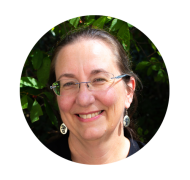
Mary Linn
Curator of Cultural and Linguistic Revitalization, Smithsonian Center for Folklife and Cultural Heritage
Mary S. Linn is a linguist and Curator of Language and Cultural Vitality at the Smithsonian Centre for Folklife and Cultural Heritage. Her primary research is in effective grassroots strategies in language reclamation and cultural sustainability, especially in small and minoritized language communities. Her work focuses on Native North America, Europe, and Tibetan areas of China. She is director of the Language Vitality Initiative that focuses on collaborative language research, training communities in language and cultural documentation, and evaluating impact of grassroots language revitalization efforts. Before coming to the Smithsonian, she was associate professor of linguistic anthropology at the University of Oklahoma and was the founding curator of Native American Languages, a collection and research department at the Sam Noble Oklahoma Museum of Natural History.

Ms. Ka’iulani Laeha
Chief Executive Officer, ‘Aha Pūnana Leo
Ka‘iulani Laehā is the Chief Executive Officer of the ‘Aha Pūnana Leo, a Native Hawaiian nonprofit dedicated to revitalizing the Hawaiian language. Building on the ʻAha Pūnana Leo’s 37 years of work to reestablish a 100% Hawaiian language medium education, Ka‘iulani is leading the organization to sustain and expand its foundational program, the Pūnana Leo preschools, and create innovative platforms to further normalize ʻōlelo Hawaiʻi in our daily lives. Kaʻiulani was fortunate to grow up at a time where ʻōlelo Hawaiʻi was once again being used and heard in pockets of Hawaiʻi, greatly attributed to the efforts of the ʻAha Pūnana Leo’s founders and pioneers of the Hawaiian language movement.
Kaʻiulani’s new role builds on her previous experience in senior non-profit management as well as her diverse background in youth programming and fund development. Just prior to joining ʻAha Pūnana Leo, Kaʻiulani served as the Development Manager for Kupu, one of Honolulu’s most distinguished nonprofits that mentors Hawai‘i’s youth to become good stewards of our culture and environment. In all of her professional roles, Kaʻiulani has held a sincere dedication to preparing younger generations for a productive and fulfilling life in Hawaiʻi and beyond.
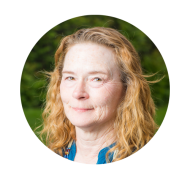
Dr. Siri Tuttle
Director, Alaska Native Language Center, University of Alaska Fairbanks
Dr. Tuttle is a linguist specializing in the Dene languages of North America, with particular experience with some that are spoken in Alaska: Lower Tanana, Ahtna, Tanacross, Koyukon, Dena’ina and Upper Tanana. She led the Alaska Native Language Archive from 2016 to 2018. ANLA is a set of collections of Alaska Native Language documentation, including both physical and digital materials (www.uaf.edu/anla). Tuttle’s dissertation (University of Washington 1998) and much subsequent linguistic research has depended on the use of archival data to locate research questions, substantiate findings, and connect modern stakeholders to older archived material. Important questions include: how to increase access for modern stakeholders to archived material created by scientific specialists; how to reconcile questions of permission and access when academic values and speaker community values collide; how to preserve materials held in private collections; and how to secure solid base funding for language archives.
- 4:15 PM – 5:00 PM // Keynote Speaker: Carol B. Cadou

Carol B. Cadou, CEO & Executive Director, Winterthur Museum, Garden & Library
Chief Executive Officer and Executive Director, Winterthur Museum, Garden & Library
Carol Cadou is the Charles F. Montgomery Director and CEO of Winterthur Museum. She assumed her role in May of 2018, after serving George Washington’s Mount Vernon for nineteen years—first as Curator and most recently as Senior Vice President for Historic Preservation and Collections.
Prior to Mount Vernon, Carol was the Curator for the Maryland State Art Collection in Annapolis and the Curator of Education and Interpretation at Historic Charleston Foundation.
Carol is a graduate of Wellesley College, the Sotheby’s American Arts Course, and the Winterthur Program in American Material Culture, a master’s degree offered in conjunction with the University of Delaware. Her publications range from The Installation of Historic Architecture at Winterthur Museum to The George Washington Collection: Fine and Decorative Arts at Mount Vernon. Carol’s latest book, Stewards of Memory: The Past, Present, and Future of Historic Preservation at George Washington’s Mount Vernon was released this year.

Day Three, Wednesday, April 7
- 9:00 AM – 10:00 AM // Safekeeping Tomorrow, Part I: Using tools, determination, and passion to serve, preserve, and protect the past

Nora Lockshin
Senior Conservator, Smithsonian Archives
With 25 years in the evolving GLAM sector, Nora S. Lockshin leads conservation and preservation programs as Senior Conservator for Smithsonian Institution Archives, Smithsonian Libraries and Archives. She provides advocacy, guidance, research, treatment, and training for people and collections throughout the Smithsonian community. She serves in multiple roles for emergency management within the Smithsonian, and externally, with Smithsonian’s Cultural Rescue Initiative has both developed training and worked on the ground with cultural heritage stewards in Haiti, the Southeastern United States, and Puerto Rico. With the Museum Conservation Institute, she serves as a subject matter expert for the analytical investigation and repatriation of stolen cultural heritage.
Nora credits her valued colleagues and mentors also at the Metropolitan Museum of Art, the American Museum of Natural History, and the University of Texas at Austin’s Libraries for a long view on the Preservation field. An alumna of both the Rhode Island School of Design, and the University of Texas at Austin, MSLIS in Certificate of Advanced Studies in Preservation and Conservation, she is a Professional Associate of the American Institute for Conservation, chapter officer for the Guild of Book Workers, and member of the Washington Conservation Guild and is on the steering committee for the DC Alliance for Response. Her lifelong study and practice in the arts motivates her support of cultural heritage preservation and access for all.

Ms. Shannon Brogdon-Grantham
Photograph and Paper Conservation, Museum Conservation Institute, Smithsonian Institution
Shannon A. Brogdon-Grantham is the Photograph and Paper Conservator at the Smithsonian’s Museum Conservation Institute (MCI). She obtained her M.S. from the Winterthur/University of Delaware Program in Art Conservation where she specialized in photograph conservation with minor concentrations in paper and preventive conservation. She holds a B.A. in art from Spelman College and her undergraduate thesis was entitled Auto-Hegemony in Carrie Mae Weems’ Daguerreotype Appropriations. At MCI, Shannon’s primary duties include collections-based conservation research, interventive treatment, and preventive care of photographic and paper-based collections across the Smithsonian Institution. She routinely collaborates with other conservators and scientists at MCI as well as collections care professionals and curators at different Smithsonian museums. In addition to working with collections, other areas in art conservation close to her heart are teaching, mentoring, and promoting equity and inclusion in the field. She is often invited to lecture on the preservation of photographs in venues around the Washington, D.C. area and beyond. Shannon is active in her professional organizations and is a member of the American Institute for Conservation and served as Vice President of the Washington Conservation Guild.
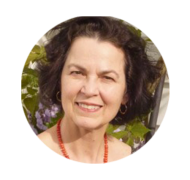
Ms. Sylvia Albro
Senior Paper Conservator, Library of Congress
Sylvia R. Albro is a Senior Paper Conservator at the Library of Congress. She received her MA and Certificate of Advanced Study in Art Conservation from the NY State Graduate Program in the Conservation of Historic and Artistic Works, in Cooperstown, NY in 1982. Sylvia has worked at the Legion of Honor Museum in San Francisco, the Yale Center for British Art, and The Phillips Collection in Washington DC (ongoing). From 2003 to 2012 she was a guest instructor in Paper Conservation at the European School for the Conservation of Library Materials in Spoleto, Italy. From 1989 to 2017 she coordinated the Advanced Internship Program in Paper Conservation at the Library of Congress together with Holly Krueger, and from 2017-2020 with Yasmeen Khan. In 2016 she published the volume Fabriano: City of Medieval and Renaissance Papermaking through Oak Knoll Press and the Library of Congress. She has published widely on Italian paper history and conservation projects at the Library of Congress. She currently serves on the Board of Scientific Advisors of the Fondazione Fedrigoni Fabriano [FFF] historical archive in Fabriano, Italy.

Dr. Anna F. Kaplan
Independent Historian
Anna F. Kaplan, PhD, is a scholar and oral historian in Washington, DC. She is the Vice President of the Board for Oral History in the Mid-Atlantic Region and a co-chair of the Oral History Association’s Diversity Committee. She has worked on projects with the National Park Service, the DC Oral History collaborative, several Smithsonian Institution museums, and the US Golf Association Museum. She is an adjunct professor and Resident Public Historian at the University of the District of Columbia and at American University. She earned her PhD in History at American University and MAs in Oral History and Anthropology at Columbia University. This past fall, Anna organized the virtual panel “In Our Own Words: Deaf Perspectives in Oral History and Public History.” She is currently working on her manuscript “Left by the Wayside: The Struggle over Control of the Memory of the University of Mississippi’s Desegregation,” which challenges the narrative of the University of Mississippi (UM) integrating in 1962 by reframing it as desegregation and the fight for integration as ongoing. She has also begun a research project highlighting how pivotal Black women’s labors were in establishing oral history programs and centers at institutions in the mid-20th century US.
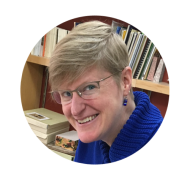
Ms. Renee Wolcott
Associate Conservator for Library and Archival Materials, American Philosophical Society
Renée Wolcott is Associate Conservator for Library and Archival Materials at the American Philosophical Society, where she repairs books for researcher use and museum exhibition. While a high-school interest survey listed “book restorer” as the top match for Renée’s skills and interests, she disregarded this advice for many years, during which she successfully pursued a BA in English from UNC-Chapel Hill, an MA in English from NC State University, and a career as a journalist, editor, and public relations specialist. Writing about science discoveries at a local museum piqued her interest in the preservation field, and her long-standing appreciation of books as vehicles for transmitting knowledge led her to pursue a new career as a book conservator. In 2011, Renée graduated from the Winterthur/University of Delaware Master’s Program in Art Conservation with an MS in book conservation. Prior to joining the APS in 2015, she worked as a book conservator at the Conservation Center for Art and Historic Artifacts in Philadelphia, where she also surveyed historic book collections and presented workshops on a variety of preservation topics. She also served as editor of the Book and Paper Group Annual of the American Institute for Conservation and taught an undergraduate class in book history and conservation at the University of Delaware. Renée’s current research focuses on the history of collections care at the APS Library, whose archives and bindings offer evidence of many approaches to rebinding, restoration, and conservation since the institution’s founding in 1743.
- 10:15 AM – 11:15 AM // Safekeeping Tomorrow, Part II: Using tools, determination, and passion to serve, preserve, and protect the past
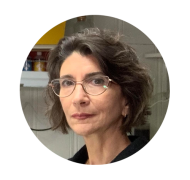
Ms. Janice Ellis
Conservator, National Museum of American History
Janice Stagnitto Ellis has been the Senior Book and Paper Conservator at the National Museum of American History since 2009. She is responsible for conservation treatment, stabilization, long-term storage and safe exhibition of paper-based artifacts in the National Collections at the Museum, and on loan to other institutions. She was the lead conservator treating “The Life and Moral Teaching of Jesus of Nazarath,” also known as the Jefferson Bible. Before coming to NMAH, she ran a private practice, and was the Senior Book Conservator at the Smithsonian Institution Libraries. She holds a Master of Science degree with Certification in the Conservation of Books and Archives from Columbia University, and has worked in the field for 35 years.

Ms. Ariana Makau
President and Principal Conservator, Nzilani Glass Conservation
Ariana Makau has been a conservator for over 20 years after receiving an MA in Stained Glass Conservation at the Victoria & Albert Museum/ Royal College of Art, in London, England. Makau previously worked at the J. Paul Getty Museum, the Victoria & Albert Museum and the Metropolitan Museum of Art and for the last 17 years has been the President and Principal Conservator of Nzilani Glass Conservation. She is a Board Member of the Stained Glass Association of America (SGAA), a Professional Associate of the American Institute for Conservation of Historic and Artistic Works (AIC), and an Independent Stained Glass Conservator/Consultant. Her position allows her to connect with a wide range of people (both within the conservation community and beyond) to show the value and relevance of art preservation.
Since establishing Nzilani in 2003 with the core values of “Be Safe. Have Fun. Do Excellent Work.”, the goal has been to provide highly specialized stained-glass conservation while also giving back to the community. Nzilani leads the industry in best practices for employee protection from lead exposure while working with leaded glass. Ariana believes that informed awareness of lead safety benefits the field rather than inciting fear. Equally comfortable on a job site or museum, she enjoys sharing Nzilani’s experience with art and architectural preservation through (in)formal presentations. Additionally, Nzilani’s in-house documentation services allow access to a broader audience, through professionally produced videos, surveys and treatment reports. In 2018, Nzilani was the recipient a California Preservation Foundation Award for its conservation of 5000+ square feet of stained-glass windows at Grace Cathedral in San Francisco.

Ms. Lindsay Jones
Owner, Blind Eye Restoration
As the owner and CEO of Blind Eye Restoration, Lindsay has made a business out of her passion for old buildings and public art. With more than 15 years of experience in the construction industry, an MS in Historic Preservation, and professional roles spanning across the country, she has realized her dream contracting company for herself in Ohio. She has been highlighted as an up and coming restoration professional in Preservation Magazine, been awarded contracts for art restoration with the City of Columbus and The Columbus Art Museum, and regularly lectures and gives hands-on workshops for local homeowners, trades training programs, and high school and college-level students. Her goals in her business include encouraging more women to work in the trades, to educate more people about the inherently “green” aspects of historic buildings, and to teach more homeowners how to work on their own homes and keep more of those historic homes out of the landfill.

Ms. Katherine Ridgway
State Archaeological Conservator, Virginia Department of Historic Resources
Katherine Ridgway is the State Archaeological Conservator for the Virginia Department of Historic Resources. She has served there since 2013, working with professionals and the public around the Commonwealth to promote the preservation of the State’s rich cultural heritage and working to conserve the roughly 6 million artifacts that belong to Virginia. She is a William and Mary graduate and attended Durham University in Northern England, where she received her master’s degree in the Conservation of Historic Objects.
For five years she was an Assistant Conservator at the Field Museum of Natural History in Chicago where she was responsible for the conservation of artifacts going on loan to other institutions and couriered them around the country and the world. Next, she moved back to her home state of Virginia to take a position as the Fine and Decorative Arts Conservator for George Washington’s Mount Vernon. She spent six and a half years there and then made the move to Richmond for her current position. Her most recent work has focused on working with communities while they decide the fates of their contested monuments.
- 11:30 AM – 12:00 PM // The Conservation of The Jefferson Bible at the National Museum of American History, Smithsonian Institution

Ms. Janice Ellis
Conservator, National Museum of American History
Janice Stagnitto Ellis has been the Senior Book and Paper Conservator at the National Museum of American History since 2009. She is responsible for conservation treatment, stabilization, long-term storage and safe exhibition of paper-based artifacts in the National Collections at the Museum, and on loan to other institutions. She was the lead conservator treating “The Life and Moral Teaching of Jesus of Nazarath,” also known as the Jefferson Bible. Before coming to NMAH, she ran a private practice, and was the Senior Book Conservator at the Smithsonian Institution Libraries. She holds a Master of Science degree with Certification in the Conservation of Books and Archives from Columbia University, and has worked in the field for 35 years.
- 12:15 PM – 1:00 PM //Keynote Speaker: Leslie Greene Bowman

Leslie Greene Bowman
President, The Thomas Jefferson Foundation at Monticello
Leslie Greene Bowman is President of the Thomas Jefferson Foundation, which owns and operates the UNESCO World Heritage site, Monticello — the home of Thomas Jefferson. She has spearheaded the Foundation’s vision to bring history forward into national and global dialogue, propelling restoration, dialogue and programs that offer an honest, complicated and inclusive view of our past – common ground for all Americans. She earned her Bachelor of Philosophy at Miami University of Ohio, and her Master of Arts in Early American Culture as a Winterthur Fellow at the University of Delaware. She has spent her entire career in museums, authored two books on American decorative arts history, and enjoyed academic appointments with both USC and UCLA, where she taught American decorative arts history. She is a trustee emerita of the National Trust for Historic Preservation, a member of the Virginia Bar Association’s Committee of Special Issues of National and State Importance, a member of Virginia’s American Revolution 250 Commission, and a fellow of the Royal Society for the Arts, in London. She continues to serve by Presidential appointment on the Committee for the Preservation of the White House, on which she previously served under Presidents Obama, Bush and Clinton.

This symposium could not have been possible without the support of the Smithsonian Institution, The American Women’s History Initiative, and the tens of thousands of individuals and 44 corporate societies that together make The National Society of The Colonial Dames of America.
Particular recognition goes to several generous individuals, including Mrs. Peter I. C. Knowles, II (NSCDA-VA), Josephine H. Detmer (NSCDA-ME) and her daughter, Zareen Taj Mirza (NSCDA-ME). Special mention also goes to the NSCDA in the State of Illinois. The donations of these remarkable women have amplified the impact of the NSCDA’s 120-year influence on the field of historic preservation.
